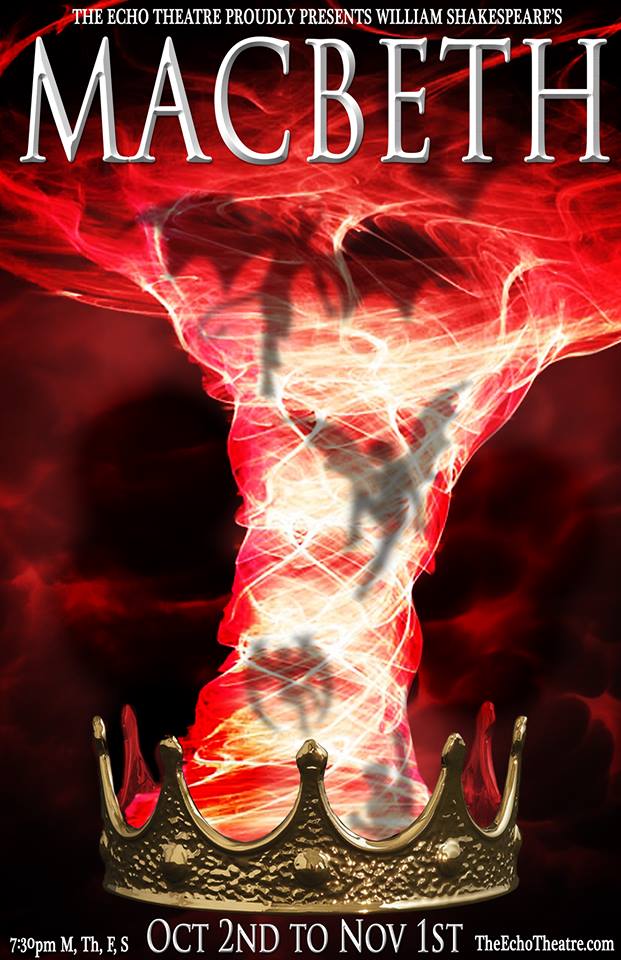PROVO — With ghosts, several murders, and three mysterious witches, William Shakespeare‘s Macbeth is a classic choice for the Halloween season. The Echo Theatre’s production is a Macbeth that tries has moments of brilliance, but fails to sustain the desired creepy mood for the entire duration of the play.

In Macbeth the title character encounters a trio of witches who prophesy that he will become Thane of Cawdor and afterwards king of Scotland. When the first prophesy is quickly fulfilled, Macbeth believes that soon he will be king. To hasten the process, Macbeth’s wife insists that he kill King Duncan. But after he does, Macbeth suffers the consequences of his treachery, thanks to his own conscience and his subjects.
As Macbeth, Ben Isaacs delivers a wonderfully nuanced performance as he shows the stages of Macbeth’s progression from reluctant schemer to tyrannical megalomaniac. Ben Isaacs easily finds the rhythm of the Shakespearean language and makes the words of the script almost sing. He also showed Macbeth’s tortured guilt after the banquet scene, and I enjoyed the subtle ways that he made Macbeth deflect suspicion away from him after Duncan’s murder. However, he was well matched by Mallory Isaacs as Lady Macbeth (and also Ben Isaacs’s real-life wife). The pair were effective at showing Macbeth and Lady Macbeth’s complex relationship, especially when Macbeth needed reassurance from his wife in order to continue their murderous course. Mallory Isaacs likewise has a superb command of the text, and her performance in Lady Macbeth’s classic sleepwalking and letter reading scenes were entrancing.
Unfortunately, the supporting cast did not meet the standards set by the Isaacses. One reason for this is that almost every other cast member played three or four roles, yet most actors failed to differentiate their characters. Compounding this problem is the confusing doubling choices (especially having Fleance and Malcolm played by the same performer, Esther Pielstick). Particularly problematic was Joel Applegate as King Duncan, an apparition, and Siward. With his poor diction and bland performance, Applegate’s scenes were some of the most difficult to sit through, especially when he portrayed a king who lacked any regal characteristics.
Nevertheless, the rest of the cast all had at least one character that was pleasing. Mandy L. Lyons was an excellent witch, and her unsettling physical movements set the tone for the witches’ scenes. Amos Omer‘s strength as Macduff was an excellent catalyst for the coup that dominates the second half of the play. Omer’s best performance was in Act IV when Macduff learns that his family has been murdered; the reaction was simultaneously powerful and moving. Josh Brown‘s best character was as the doctor observing Lady Macbeth’s sleepwalking, though this failed to make up for his wooden and uninteresting Banquo. Finally, Laura Randall—the youngest cast member—had a performance beyond her years as the third witch, and her disturbing physicality removed any doubts I had about casting a child in such a large role.
Like the cast, the work of director Kris Wing Jennings was uneven. Scenes that worked were supremely executed, such as the final fight and the second witches’ scene, because of the care that Jennings took to emphasize the Shakespeare’s words and establish the appropriate mood for the play. However, a few pivotal scenes were more sloppy, which created difficulties for the play. For example, the last witches’ scene is vital to the story because it is where Macbeth learns of two more prophecies that he believes are impossible to fulfill, which gives him a sense of invincibility. But when these prophesies were delivered it was during a time when there was so much stage business and chaos occurring that this important plot point was easy to miss.
Contributing to the confusion of the play was Cherie Julander‘s costuming. Although dressing everyone in shades of grey served to create a united visual style, the similarity of costumes made it difficult to distinguish actors’ characters from one another. Additionally, Julander’s costumes, unlike her wonderfully creative work in A Midsummer Night’s Dream, looked like a copycat of a Grassroots Shakespeare Company production. Jeffrey Blake‘s set was versatile and created an industrial feel to the play, and the movable doors provided some pizzazz to the otherwise bare stage.
Although this Macbeth has its share of “toil and trouble,” the Echo Theatre Company’s Macbeth has some delightful aspects that make it appropriate for the Halloween season. The flashes of brilliance provided by Jennings, the lead actors, and some of the supporting cast make the show worth attending.
[box type=”shadow”]Macbeth plays at the Echo Theatre (15 N. 100 E., Provo) every Thursday, Friday, Saturday, and Monday at 7:30 PM. Tickets are $9-12. For more information, visit www.theechotheatre.com.[/box]
